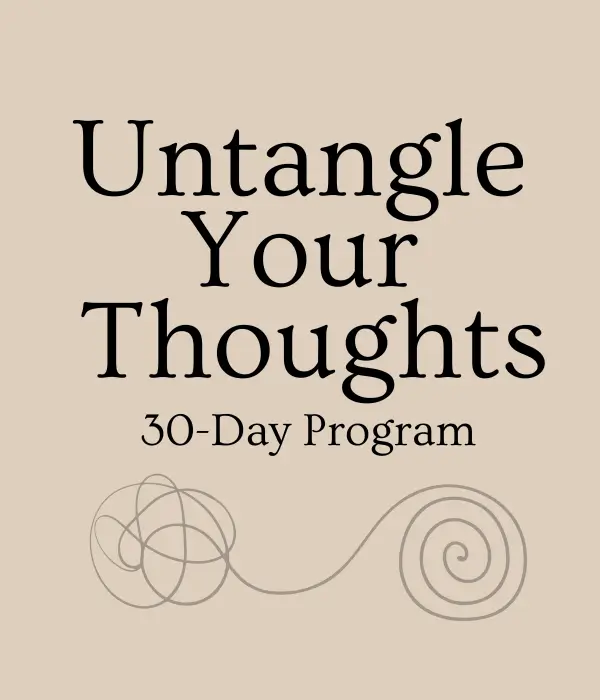Understanding discernment and dealing with a critical spirit, as guided by the Word of God, is essential for our spiritual growth and relationships. In a world filled with diverse perspectives, it’s important to discern truth from falsehood without becoming overly critical. The Bible offers wisdom on how to develop discernment, differentiate between constructive criticism and harmful judgment, and approach others with love and humility.
If you’ve been around for any length of time on social media, you’ve probably seen these words floating around. It can feel overwhelming. We often see people calling other people out and canceling ministries.
This blog post is for you if you have been feeling overwhelmed by what you see on social media. You are trying to learn what spiritual discernment is for yourself to be able to identify the critical spirit and test the spirits for yourself versus going to somebody and listening to what they have to say.
By the way, what if I told you your feelings aren’t inherently bad or sinful? You don’t need to fear or suppress them. They can be a guide. If you’re interested, I have a free 3-day study on living by faith while processing emotions. Check it out here!
Learning Discernment and Knowing the Critical Spirit
Our time together will be learning discernment and calling people out and false teachers. One of the issues we’re seeing today in Christian culture, which is really carrying over from a secular call out culture, is telling people, this is just how it is. We’re not talking about those core doctrines, Jesus is the Christ. Or another example, He was resurrected from the dead who was born of a virgin.
We are talking about the worship music that somebody uses in their church, or, maybe their salvation doctrine differs a little bit. And when we see people saying, this is exactly what you have to think about all of these secondary, non-core issues, instead of saying, hey, let’s process through this together, let’s look at what scripture says.
Teach people how to analyze different things, according to the standard of Scripture. What you end up doing is you disciple people who have to depend on you and your interpretation. To make decisions about what they’re reading and seeing in the world. Instead of equipping them to go and read, and see and interact and converse, bring that information back. process it with the Lord and with the word. You’re creating people who are dependent upon you, they are weak without you, as the teacher. And so, a Bible teacher’s goal should not be to create disciples of themself but to create Disciples of Christ. And in order to do that, you have to strengthen them to know how to think not just what to think.
*You can also read about false teachers here!
What is Discernment?
Let’s talk about what discernment is. So according to the dictionary, it’s simply to judge well, to judge well, but from a Christian perspective, it’s more a perception to obtain spiritual guidance is what the dictionary says from in Christian culture.
Discernment carries the idea of judging the merits of something, being able to distinguish between good and bad and what is best, it does not change the challenges we face. It changes our abilities to face them. The discernment we’re seeing in today’s Christian call out culture kind of deal is almost entirely negative. It’s focused on finding the negative, finding the bad, guess who’s the latest false teacher, guess what so and so said, and we get these little sound bites and quick clips of whole sermons, you know, someone’s one-liner is taken and then expanded to say they’re saying all of this.
Then the question is, how do we discern through that? Maybe they are a false teacher, maybe they aren’t. But you are creating such fear, in such anxiety in the church over this, instead of creating quiet, restful, confident disciples who know what they believe, and how to interact with the world through that lens.
What Does It Mean to Call Out the Good Versus Seeing the Wrong?
There’s a documentary that came out very popular with believers. It’s an Orthodox Christian documentary that talks about a real problem in the church today, which is the prosperity gospel. That is the idea that if you follow Jesus, He will give you money, success, and prosperity. It’s counterintuitive to what the gospel actually says, which is, if you follow Christ, you will suffer in some aspect in this world. So, the prosperity gospel is a real problem in today’s church, and this documentary seeks to expose it. But one of the things that documentary did is first, it did not admit its own bias, it has a specific theological bias. (Learning discernment and knowing the critical spirit helps us to have wisdom with whatever we watch or read.)
How might that change how this person interprets information. The second thing that the documentary did was it showed brief clips of different pastors and famous Christian influencers, sermons or messages. But the clips were out of context. And they didn’t give the full context of what was being said, because it was just one clip of that person.
The documentary was talking about the prosperity gospel. The only thing you could take away from it was that preacher is a prosperity gospel preacher. Whenever you see that content shared by somebody in your life, your sister, your friend on Facebook, the first thing that will come to your mind is, that’s a false teacher. My friend is being deceived by a false teacher, even if that particular Christian pastor had said true and good things that other times in his life.
In that example, it’s not that the documentary was bad or wrong. It’s that the way the information was presented, seems to imply something that may or may not be true on the grand scale. Our job as Christians then would be to understand how to discern through what seems like a very trustworthy documentary and how to also discern through the content of a prosperity gospel preacher. It’s not easy, I would say this is a lifelong thing. So I’m not saying that this is like, you know what, once you get it, then you’re all good. And you’re never going to struggle to find what’s true and what’s not. I do think there’s a struggle in that sometimes. But I think the journey to wanting to discern rightly, is a good journey and one that we all should be on.
Testing the Spirit
I think we often use that interchangeably, right? Discernment, testing the spirits. And what does it mean then to test the spirit? And how is it different than discernment?
John 4:1, “Beloved, do not believe every spirit, but test the spirits to see whether they are from God, because many false prophets have gone out into the world. By this you know, the Spirit of God, Every spirit that confesses that Jesus Christ has come in the flesh is from God. Every spirit that does not confess Jesus is not from God. This is the spirit of the Antichrist. What you have heard that it is coming, and is now already in the world.”
What he is talking about here, contextually, at this point in early church history. There were already factions rising up saying that Jesus wasn’t actually God. Gnosticism was a huge threat at that time. The idea that Jesus just appeared to be God, he wasn’t actually a man, he’s just a spirit. And so really directly contradicting the gospel. And so what John’s saying here is, when somebody tells you something about the gospel about Jesus, test it against what you know is true to be sure that it is true, right?
Use the Word of God as your measure to know what’s true, because there are false prophets in the world, right? And once you have measured it, he says, like this is our measure here. If Jesus Christ is confessed, as coming in the flesh from God, then you know, if it lines up with that with the gospel, then it’s true.
Now, the interesting thing that he says here in verse four after he says, All this, about testing the spirits is you are from God, little children, and have overcome them. Because greater is He who is in you than he who is in the world. And I think when we’re talking about testing the spirits that verse four should be our lens for that. We do not test the spirits out of fear or test out of anger. We don’t test them out of frantic, panicky anxiety or but from quiet confidence that he who is in us has overcome the world. And when you are testing and measuring and thinking through things, and you have that confidence that he is He is king. You’re not going to fall so easily into the anger and the panic and the judgment.
Critical Spirit
A critical spirit, the difference between a discerning spirit and a critical spirit. I’ll give you some examples. What a critical spirit looks like. critical spirit looks for what is negative and evil. They exalt man’s wisdom above God, they take on the Holy Spirit’s role. So instead of trusting that the Holy Spirit convicts and leads in matures people to the point where they can see things, truthfully, truthfully, the critical spirit in a Christian means they no longer trust the Holy Spirit’s doing his work, they start to take that over, I need to tell you exactly what to think on all of these issues. And I need to basically grow you up faster than maybe the spirit is even growing someone up. Learning discernment and knowing the critical spirit help you to discern from evil and good.
A critical spirit and a Christian believe it’s their job to be the Holy Spirit for other believers. And it can actually end up putting a stumbling block in the way of younger or newer believers, a couple of things about it. They create division over secondary issues. They look for opportunities to find flaws and other believers. And most of all, they are tone deaf. They believe that it does not matter what they sound like or how they talk, as long as the truth gets out. And they could even be preaching the gospel.
The way they’re preaching the gospel is so offensive, that the people around them move away from the gospel instead of being drawn towards it. And I often quote, I don’t remember who said this, but there’s a quote that says, The Gospel is inherently offensive. You don’t need to be, you don’t need to be, it will offend people all on its own. And so your job is to present it kindly, and let the Holy Spirit do His work. So critical spirit, sorry, sneaky. And it really starts with a lack of respect for the Holy Spirit’s role, and the Holy Spirit’s work, and a lack of dependence on the Holy Spirit, when it comes to what you personally are speaking.
Critical Thinking
Someone who is naturally a critical thinker, having a critical spirit is just a hop, skip, and a jump away. You have to be so careful to bring this to the Lord. I have to bring this to the Lord daily. I ask him, Lord, help me to walk in your spirit and not sit from my little throne of judgment on every single thing that I see. So when we’re checking our hearts, a few things that I would ask is, what’s my view of God’s sovereignty? Do I believe that God is sovereign enough to defend himself sovereign enough to defend his gospel? When we start to think that God isn’t strong enough to defend himself, we start thinking, we have to be his defense committee. Learning discernment and knowing the critical spirit will help you analyze before you react.
The second question is, do I think that the Holy Spirit needs my help to convict people? Or am I actually following his leading in when to speak up and when to be silent? Oftentimes what the Lord is calling you to do is be quiet. The harder and bolder thing for you is to be quiet. For the more passive personality, he may be calling you to speak up. God often calls us to what’s hardest for us.
For bold personalities instead of and I’m a bold personality saying this, instead of going, Well, God just made me this way. And so I’m just gonna use my word bazooka on everybody sitting back and saying, is the Lord truly calling me to speak in this moment? And then the last thing is, ask myself, Am I proof texting the Bible to support my own sarcasm? Because I see this happen a lot. Jesus was mean Jesus flip tables in the temple, and they prove text verses to support it. When the very thing that they hate is proof texting. The reality is that Jesus was harsh, very rarely.
Call Out Culture, Critical Spirit Christianity
The root cause of our current call-out culture critical spirit, Christianity, is ultimately a disconnection from walking in the spirits leading. And I could get into denominations and what that looks like, but we don’t have time. So the solution would be study the Holy Spirit, What’s he supposed to do? Start in John 15, through 17? What is he supposed to do? He is supposed to lead you into reflecting the character of Christ. Then go over to Galatians look at the fruit of the Spirit. But the reality is, they’re connected to John 15. As you abide in the vine, the fruit grows naturally. So love, joy, peace, patience, kindness. (Learning discernment and knowing the critical spirit plays a key role in loving other people well.)
Those are things that come out of us as we abide in Christ. So then the question is, am I abiding in Christ? Am I listening for the spirits actual leading when I am talking to people? Lord, what do you want me to say here? Lord, do you want me to be quiet? I think of King David. Saul didn’t see God before he went into battle. David did and the difference that made for them, same kind of concept.
Am I seeking the Holy Spirit and saying, Spirit lead me into how I should talk, how I should behave. When we concentrate on that leading, and we stay in the Word, He will remind us of the word and say. You know what, this is your opportunity to be Ephesians 415 Speak the truth in love. Let’s go over to First Corinthians 13. What does love look like? And He’ll guide us through the word when we place priority on following him.
Thanks so much for listening to today’s interview on learning discernment and knowing the critical spirit with Phylicia Masonheimer. I know that she speaks such wisdom and really teaches us how to address things. I love how we are learning discernment and the critical spirit for ourselves.
Knowing Discernment Moving Forward
The root cause of call-out culture in Christianity is a disconnection from waiting for the Holy Spirit’s leading. Study the Holy Spirit and abide in Him. He will always lead you to reflect Christ.
Phylicia Masonheimer is a bestselling author and podcast host. She teaches Christians how to know what they believe and live it boldly. She holds a degree in religion from Liberty University and lives in northern Michigan with her husband and three kids.
Follow Phylicia: website | Instagram | Facebook | podcast
Follow Jessica: website | Instagram | freebies
Subscribe to my podcast here!
If you enjoyed today’s episode, I would be so grateful if you left me a review over on iTunes, too. I love hearing your feedback! Just click here to review, select “Ratings and Review” and “Write a Review”. Let me know what you loved about today’s episode. Share with me what truth you are standing on today!






Thank you so much for this.
How would you react to a friend (a close friend supposedly) who is mostly critical, that each time you see that person they would mostly complain about something or call out something that is wrong. I get that I have to love this person but if I see it over & over again & not say anything I feel like I am not loving this person
I think this is a great question. I know how hard this is. I would start by asking her questions. See where she is coming from and her beliefs about God. Get to know her perspective and see if she even recognizes she is that way.
I have seen the same spirit in three family members that criticize and say they don’t want to attend a particular church because:
!) The music is too loud.
2) The series about community is not for them.
3) The sermons aren’t intellectual enough.
All three of these family members said these comments about the same church!
Is this a critical spirt or a religious spirit?